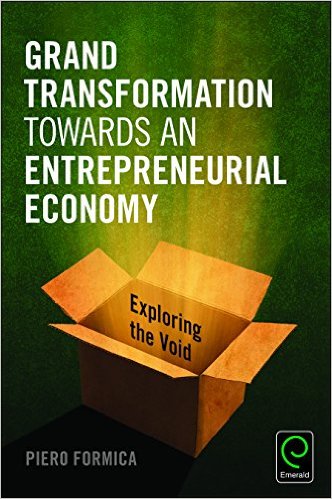Young people who vote for tomorrow are penalized, unless there is a void arising from emptying the vase full of government schemes and measures often inherently biased against the new generations.  The transition from a labour economy based on job seeking to an entrepreneurial economy focused on finding opportunities to launch high expectation, high-growth start-ups is a Grand Transformation that requires combining the elements of taxation and public spending so as to render this qualitative shift viable. The combination must be such as to enable opportunity progressivism rather than redistributionist progressivism. This could mean drawing a new puzzle whose solution requires fewer pieces of taxation and public spending. The economic policy measures are the outcome of a creative process of policy making that begins with the formulation of the problem and ends with the evaluation of achievements. The measure under consideration needs to be structured, developed, implemented, maintained and monitored. All of these steps are captured by the high-level bureaucracy of the director-generals of ministries and heads of the Cabinet of Ministers. They, too, submit the measures to a regulatory process designed to complicate interpretation. Thus senior bureaucrats gain in power, create grey areas of interpretation that encourage corruption and “clientelism,” and are neither impartial nor accountable in the way that they operate to regulate the choices of the legislator. Italy has filled up the tank of governmental measures with unproductive debt. The result is a population bureaucratized and subjected to oppressive public regulations. As circumstances have changed irreversibly compared to the years before the Great Recession, policy makers remain stuck in midstream, failing to get rid of the ballast of vested interests. State ownership in cahoots with those interests is always inclined to propose industrial policies that sacrifice the individual initiatives of the revolutionary innovators. As a whole, innovative start-ups are subordinated and sometimes stifled by corporatist interests. In these circumstances, creating a legislative vacuum into which senior bureaucrats fall would mean breaking down the high regulatory barriers that impede market entry for new entrepreneurs offering innovative solutions compared to those already available. This move would produce positive results first and foremost in the highly protected and regulated industries. When the founders of new businesses must comply with countless paperwork and are forced to make use of the services provided by expensive law firms, the very notion of “start-up” becomes an oxymoron. Guest editor: Piero Formica Professor Piero Formica started his career as an economist at the OECD Economic Prospects Division in Paris, then moving to academic institutions. Professor Formica is Founder of the International Entrepreneurship Academy and Senior Research Fellow at the Innovational Value Institute where he leads an international research team on experimentation and simulation of high-expectation start-ups, and is the course leader of Experimental Entrepreneurship at the University Centre for Entrepreneurship, Design and Innovation. He is Adjunct Professor of Knowledge Economics, Innovation and Entrepreneurship at the Faculty of Entrepreneurship, University of Tehran (Iran), and a Guest Professor at the University of Tartu (Estonia) where he held the Marie Curie Professorship at the Faculty of Economics and Business Administration. In the last five years Professor Formica has extensively published in the fields of knowledge economics, entrepreneurship and innovation. THE EXPERIMENTAL NATURE OF NEW VENTURE CREATION. Capitalizing on Open Innovation 2.0, Springer, June 2013, is his new book co-edited with Professor Martin Curley (VP Intel Co.). Piero’s most recent essays are: STORIES OF INNOVATION FOR THE MILLENNIAL GENERATION. The Lynceus Long View, Palgrave Macmillan, August 2013; THE ROLE OF CREATIVE IGNORANCE. Profile of Pathfinders and Path Creators, Macmillan Palgrave, December 2014; GRAND TRANSFORMATION TOWARDS AN ENTREPRENEURIAL ECONOMY. Exploring the Void, Emerald Group Publishing, December 2015. www.ivi.ie http://www.intentac.net [email protected]
The transition from a labour economy based on job seeking to an entrepreneurial economy focused on finding opportunities to launch high expectation, high-growth start-ups is a Grand Transformation that requires combining the elements of taxation and public spending so as to render this qualitative shift viable. The combination must be such as to enable opportunity progressivism rather than redistributionist progressivism. This could mean drawing a new puzzle whose solution requires fewer pieces of taxation and public spending. The economic policy measures are the outcome of a creative process of policy making that begins with the formulation of the problem and ends with the evaluation of achievements. The measure under consideration needs to be structured, developed, implemented, maintained and monitored. All of these steps are captured by the high-level bureaucracy of the director-generals of ministries and heads of the Cabinet of Ministers. They, too, submit the measures to a regulatory process designed to complicate interpretation. Thus senior bureaucrats gain in power, create grey areas of interpretation that encourage corruption and “clientelism,” and are neither impartial nor accountable in the way that they operate to regulate the choices of the legislator. Italy has filled up the tank of governmental measures with unproductive debt. The result is a population bureaucratized and subjected to oppressive public regulations. As circumstances have changed irreversibly compared to the years before the Great Recession, policy makers remain stuck in midstream, failing to get rid of the ballast of vested interests. State ownership in cahoots with those interests is always inclined to propose industrial policies that sacrifice the individual initiatives of the revolutionary innovators. As a whole, innovative start-ups are subordinated and sometimes stifled by corporatist interests. In these circumstances, creating a legislative vacuum into which senior bureaucrats fall would mean breaking down the high regulatory barriers that impede market entry for new entrepreneurs offering innovative solutions compared to those already available. This move would produce positive results first and foremost in the highly protected and regulated industries. When the founders of new businesses must comply with countless paperwork and are forced to make use of the services provided by expensive law firms, the very notion of “start-up” becomes an oxymoron. Guest editor: Piero Formica Professor Piero Formica started his career as an economist at the OECD Economic Prospects Division in Paris, then moving to academic institutions. Professor Formica is Founder of the International Entrepreneurship Academy and Senior Research Fellow at the Innovational Value Institute where he leads an international research team on experimentation and simulation of high-expectation start-ups, and is the course leader of Experimental Entrepreneurship at the University Centre for Entrepreneurship, Design and Innovation. He is Adjunct Professor of Knowledge Economics, Innovation and Entrepreneurship at the Faculty of Entrepreneurship, University of Tehran (Iran), and a Guest Professor at the University of Tartu (Estonia) where he held the Marie Curie Professorship at the Faculty of Economics and Business Administration. In the last five years Professor Formica has extensively published in the fields of knowledge economics, entrepreneurship and innovation. THE EXPERIMENTAL NATURE OF NEW VENTURE CREATION. Capitalizing on Open Innovation 2.0, Springer, June 2013, is his new book co-edited with Professor Martin Curley (VP Intel Co.). Piero’s most recent essays are: STORIES OF INNOVATION FOR THE MILLENNIAL GENERATION. The Lynceus Long View, Palgrave Macmillan, August 2013; THE ROLE OF CREATIVE IGNORANCE. Profile of Pathfinders and Path Creators, Macmillan Palgrave, December 2014; GRAND TRANSFORMATION TOWARDS AN ENTREPRENEURIAL ECONOMY. Exploring the Void, Emerald Group Publishing, December 2015. www.ivi.ie http://www.intentac.net [email protected]

Piero Formica, GRAND TRANSFORMATION TOWARDS AN
ENTREPRENEURIAL ECONOMY. Exploring the Void, Emerald Group
Publishing, Dicembre 2015testo in italiano..
© RIPRODUZIONE RISERVATA
